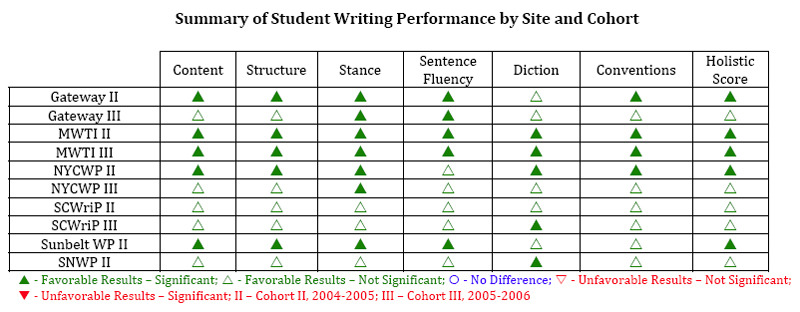Summary: This report on the 2004-2006 results of Local Sites Research Initiative studies demonstrates the positive impact of NWP professional development on student learning. Conducted at a variety of sites around the nation, these studies consistently showed greater improvement in writing on every measured attribute among students taught by NWP-trained teachers, when compared with students taught by teachers who were not NWP-trained. These results may be useful in making a case for NWP work in your school or district.
Original Date of Publication: May 2008
Overview
This growing national portfolio of locally defined research projects studies the impact of the writing project model on teachers and students in a range of contexts, all featuring intensive professional development partnerships between NWP sites and schools or districts.
During 2004–2006, six NWP sites conducted research projects: Gateway Writing Project (University of Missouri, St. Louis), Mississippi Writing/Thinking Institute (Mississippi State University), New York City Writing Project (Lehman College), South Coast Writing Project (University of California, Santa Barbara), Sunbelt Writing Project (Auburn University, Alabama), and the Southern Nevada Writing Project (University of Nevada, Las Vegas). Each study employed a quasi-experimental design and used a variety of complementary methods of data collection and analysis to investigate how key components of their program contributed to changes in teaching practices and in student writing achievement.
Summary of Results
Each NWP group was compared to the comparison group on six attributes of writing and an overall holistic score. Across sites both years, the results favor students of NWP teachers.

The results, taken across sites and across years, indicate a consistent pattern favoring the NWP. For every measured attribute of writing and in every site, the improvement of students taught by NWP-participating teachers exceeded that of students in classes whose teachers were not participants. Moreover, in 36 of the 70 contrasts (51%), the differences between NWP participants’ students and comparison students were statistically significant.
Conclusion
These studies uniformly suggest the positive impact of NWP programming: students in NWP teachers’ classrooms experience consistent and positive results. The studies further document improvements in participating teachers’ practices (documentation made possible by the increased sophistication of classroom data collection and analysis tools employed by LSRI researchers), providing evidence that differences in teaching practice can account for student outcomes.
Finally, the LSRI studies confirm that NWP programs—while varied by context—maintain a commitment to high-quality professional development. In addition, the LSRI studies go beyond the typical contribution of evaluation studies by contributing to the field of writing instruction in several ways: building local NWP site research capacity, spawning further research on writing assessment, deepening teachers’ understanding of student writing, and developing the Analytic Writing Continuum, which will be used in future national assessments.
Download “LSRI Two Year Report: Cohort II and III”
Related Resources
- Assessment in a Culture of Inquiry: The Story of the National Writing Project’s Analytic Writing Continuum
- Stories of Impact: The On-Site Work of the New York City Writing Project
- Evaluating the Impact of Professional Development Programs
- Engaging Stakeholders: A Site’s Year in Review
Original Source: National Writing Project, https://www.nwp.org/cs/public/print/resource/2587